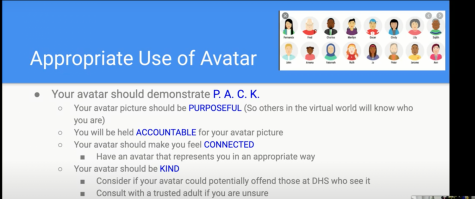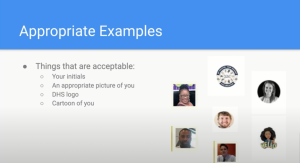DHS Administration implements new guidelines for online avatars

The Decatur High School administration is implementing a set of guidelines for students to follow when creating and changing their online avatars. These guidelines have been detailed in a video sent out by assistant principal, Jessica Sturm, on Thursday, Sept. 10.
During online education this fall it has become apparent to the DHS administration that some students’ avatars are inappropriate, such as by containing vulgar language, political pictures, and obscene images.
The guidelines declare the only appropriate student avatars to be a picture of yourself, your initials, or a cartoon of yourself.
Sturm hopes that students will “own their identity in a positive way.”
The administration does not expect all students to change their avatar immediately but hopes that the detailed video they sent, coupled with previous announcements, encourages students to do so soon.
“Our job is not just to teach you academics, it’s to prepare you for after high school,” Sturm said. 
This school year, DHS implemented the acronym P.A.C.K. to guide students on how to be model students. Students are expected to be part of the P.A.C.K., which stands for Purposeful, Accountable, Connected, and Kind. “We want to make sure your avatar demonstrates you being part of the P.A.C.K.,” Sturm said.
“It makes sense that we should have our faces as our profiles, so teachers can at least know what we look like…The profile is one of the only ways to show our personality online,” freshman Gabi Gould said.
World history teacher Kristen Embry was glad when DHS administration announced the creation of school wide guidelines on avatars.
Embry taught summer school and knew what to expect of virtual school. She is accustomed to students turning their cameras off in google meets. When one’s camera is off, only the student’s avatar appears to others. Seeing this pattern, Embry wanted a way to see and meet her students even if their cameras were off. So, she asked them to change their avatars to a school-appropriate picture of themselves. She found that students began to adopt more professional avatars to prepare for their future outside of high school. “This was a perfect teachable moment for digital responsibility,” Embry said.

Daphne Hall (Class of 2023) is elated about her fourth year on the Convergence Media Staff and graduation. She enjoys playing soccer, baking, and hanging...





